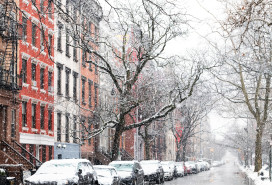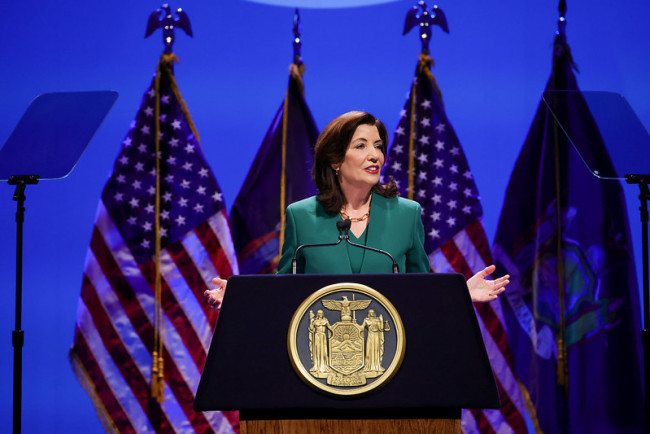Hochul proposes record-high $252 billion budget with funds for the City of Yes
- Hochul's budget includes a $50 million down payment assistance program
- The governor called on Congress to fully repeal the SALT deduction cap

Hochul discusses her $252 billion budget for New York's 2026 fiscal year.
Photo courtesy: Mike Groll/Office of Governor Kathy Hochul
Governor Kathy Hochul proposed the biggest New York state budget in history on Tuesday, including $1 billion in state funding for New York City’s plan to build 80,000 new apartments over the next 15 years, dubbed City of Yes for Housing Opportunity.
Beyond funding City of Yes, Hochul reiterated her promise to provide down payment assistance for first-time New York home buyers and to construct more “starter homes.” She also called on Congress to repeal the state and local tax (SALT) deduction cap—a move that would benefit wealthier New Yorkers.
“The cost of housing and rent will never come down if we don’t increase the supply,” Hochul said in her overview of her proposed budget. “We have to build, build, and build some more.”
Hochul’s budget comes amid concerns that newly inaugurated President Donald Trump could cut federal funding to states such as New York. The state may not be able to make up for upcoming shortfalls, though it does have $21.2 billion in reserves, Hochul said.
“Elections have consequences,” Hochul said. “I cannot stand here and say that the state of New York is going to backfill all the federal dollars. No state governor can do that.
Read on for what you need to know about the housing initiatives in Hochul’s proposed budget.
A promised $1 billion for City of Yes
Hochul committed to providing $1.025 billion in state funding for the City of Yes for Housing Opportunity, NYC’s historic plan to spur housing development.
The move was expected; The City Council passed the City of Yes in December, after Hochul agreed to provide the city with $1 billion in funding on top of $4 billion in city funding for the program.
City of Yes aims to create 80,000 new additional housing units—less than the up to 109,000 units originally proposed—by curtailing parking requirements, reforming zoning laws, and requiring the inclusion of income-restricted units.
A ‘full repeal’ of the SALT cap
Hochul called on Congress to repeal the SALT cap—which lets taxpayers who itemize their tax deductions reduce their federal tax bill.
Trump’s 2016 administration created a $10,000 ceiling on the formerly unlimited SALT deduction, an unpopular move for wealthier residents of high tax-states such as New York. (On the campaign trail, Trump vowed he would roll back the SALT cap, NBC reported.) Removing the cap would save New Yorkers $12 billion a year in federal taxes, Hochul said Tuesday.
“New Yorkers need another form of relief, and that's removing the state and local tax deduction cap,” Hochul said on Tuesday. “Full repeal or no deal.”
Trump’s advisors have debated a far more limited approach—raising the cap from $10,000 to $20,000—though a handful of House Republicans are reportedly planning to push for a higher threshold, CNBC reported. Mark Massaroni, a deputy budget director, said on Tuesday that he does expect a full repeal of the SALT cap.

If the SALT cap were limited, NYC residents would stop paying roughly $7.5 billion in taxes to the federal government, and could have more money in their pockets to spend on housing, according to a report from NYC Comptroller Brad Lander.
But those savings would largely benefit the wealthiest New Yorkers. The vast majority of that money—about $7 billion—comes from households who make $200,000 or more per year, Lander previously told Brick Underground.
Still few details on down payment assistance
Hochul reiterated her plans to spend $100 million on a down payment assistance program and to incentivize the construction of new “starter homes,” two proposals she announced during her State of the State address last week.
On Tuesday, Hochul said she would create a $50 million down payment assistance program for first-time homebuyers, and spend the other $50 million to encourage “the building of more starter and modular homes.”
Hochul’s speech and budget outline did not provide more details on how those down payment funds would be awarded, or who would be allowed to receive the money. But a spokesperson for the governor shared that low- and moderate-income first-time buyers would be eligible.





























